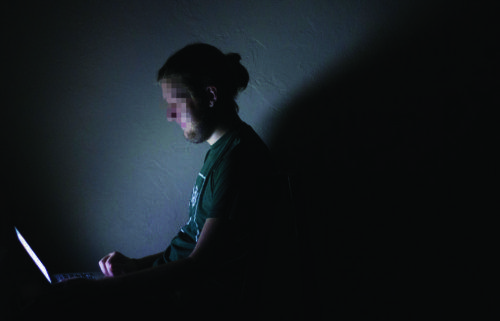
A man going under the alias Brian sits behind his computer as he anonymously posts “I’m going to kill every last … Muslim & Jew on the entire planet,” to his website bombislam.com.
White supremacists and hate groups alike are now using the Internet as a forum to post their ideologies with like-minded people. And they do it all anonymously.
Bombislam.com is an online community where people have the freedom to post their hate speech toward Muslims, Jews, and any other group they dislike. By doing so, it’s raising ethical questions on the Internet, especially when that speech is anonymous.
The Arizona-based website is a forum for the alt-right that has gained over 200,000 hits and continues to grow. However, the creator of the website has remained anonymous since 2005. This has become a commonality for hate speech sites, as white supremacists want to get their message out, but refuse to reveal their true identities.
The content of the website includes videos of people tearing up Qurans, protesting Islam and violent attacks on Muslims. A popular video on the site displays a group of white supremacists chanting, “Islam is a cancer, nukes are the answer,” while holding signs that compare the Islamic crescent moon symbol to swastika.

A concerned blogger, Scott Carney, based in Denver, Colorado, discovered the website after the creator commented on one of his blog posts. “I didn’t really like these guys. I thought about writing them a little message saying that they were idiots, but I figured that engaging them in open debate would be pointless,” Carney said.
Instead, Carney decided to get the website taken down. “The author of the comment, Brian, hosted BombIslam.com which compared the world population of Muslims as a strain of HIV that could only be cured with TNT and hydrogen bombs,” Carney said. However, Brian didn’t have any other contact information and has also gone under the name Robert.

The internet doesn’t have clear or set rules against hate speech, which is a primary reason why these websites continue to exist. Most host sites don’t realize that they are home to these hate forums and must be alerted before they will do anything to take the website down.
Anonymity hasn’t been common in traditional print media. Terry Wimmer, a University of Arizona professor who testifies frequently in libel cases involving anonymity, says accountability comes down to responsibility. “You could not write a letter to the editor that was anonymous. Editors required names addresses and phone numbers so they could check to make sure the person writing it actually had written it. It ensured some sense of accountability for the person who wrote it.”
When newspapers and other media outlets began opening up forums for discussion, they discovered the problem of people posting anonymously. “People could call somebody a yellow belly sap sucker and use whatever name they want so there was no accountability,” says Wimmer. Now many newsrooms have shut down their comments section because of the anonymity problem.
“In theory I believe people should be responsible for their words and their actions,” Wimmer said. “We should demand to know who is saying what. How else can we be fair?”
M. E. Kabay, a professor of computer information sciences at Vermont’s Norwich University, studies the social and legal consequences of anonymity in cyberspace.
“I think that using anonymity or pseudonymity insulates individuals from the consequences of their actions, whether it be criminal such as threatening violence or as libel which can be taken to civil court,” Kabay said.
“Anonymity protects them against the legal restrictions of hate speech in the United States as well as in other countries so they are protected from prosecution,” he continued.
Hate speech isn’t illegal in the United States, but users feel comfortable posting it online because they don’t face responsibility for their actions. “Most of the time anonymity isn’t used to protect people from illegal activities, but what they perceive to be immoral activities,” Kabay said.
However, people believe they are anonymous might not be. “It is a myth,” Kabay said. “There are many ways of tracking supposedly anonymous people who are using the same computer equipment.”
This tracking uses a forensic analysis that can track IP addresses to their source of origin. This is also the way that Carney was able to track down the creator of bombislam.com
“I logged their URL into the WhoIs database with the intention of finding out who registered the site. Not to my surprise, whoever Brian is, he didn’t want to leave his contact details. I did, however, discover that they were located somewhere in Arizona and they were using a service provider called Tucows to host their web space,” Carney said.
Carney decided to contact Tucows to alert them of the hate speech, but also to let them know Brian was going against federal guidelines by not providing his full contact information. The site was eventually shut down (only to later go back up) and Brian’s true identity still hasn’t been discovered.
Recently different versions of the bombislam website have gone up and other sites and forums circulate the Internet. But they continue to be held unaccountable.
Chad Hanna is a reporter for Arizona Sonora News, a service from the School of Journalism with the University of Arizona. Contact him at [email protected]
Click here for a Word version of this story and high resolution photos.
https://drive.google.com/drive/folders/1Pwzya2X2x3qME9rVJoI1CvYdzZYThhTp?usp=sharing

